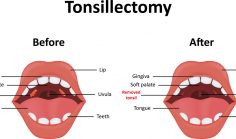A hernia is the protrusion of an organ or piece of tissue from it’s normally contained space. Part of an organ is displaced and protrudes through the wall of the cavity containing it. Hernia often involves the intestine at a weak point in the abdominal wall, which is constructed of layers of different muscles and tissues. Weak spots can develop in these layers, which can allow contents of the abdominal cavity to intrude. Hernias may be present at birth (congenital) or develop any time thereafter (acquired).
Many people have abdominal hernias. As much as 10% of the US population will develop some type of hernia during their lifetime—and more 500,000 hernia operations are performed in the United States each year. While women account for only 8% of the hernias that are diagnosed, those that afflict women are usually small and internal, and are more hidden, rarely causing an obvious bulge. Women’s hernias commonly entrap abdominal fat and compress nerves.
The most common types of hernia are:
- Inguinal. Inner groin. Approximately 96% of groin hernias are Inguinal. The intestine or bladder protrudes through the abdominal wall or into the inguinal canal in the groin
- Incisional. Resulting from an incision, when someone has this type of hernia, the intestine pushes through the abdominal wall at the site of a previous abdominal surgery. Most common in the elderly or overweight people who are inactive after surgery
- Femoral. Outer groin. These are most common in women, occurring when the intestine enters the canal carrying the femoral artery into the upper thigh
- Hiatal. Upper stomach. This type of hernia happens when the upper stomach squeezes through the hiatus—an opening in the diaphragm through which the esophagus passes
- Umbilical. These hernias occur around the belly button as a result of the weakened nature of the abdominal wall in this area. Women are particularly vulnerable to this hernia
Other types of hernias include: - Obdurator. These are in the pelvic floor, found in women who have had multiple pregnancies, or lost significant weight
- Traumatic diaphragmatic. This type of hernia occurs due to major injury where blunt trauma weakens or tears diaphragm muscle
- Spigelian. This occurs on the outer edges of he rectus abdominus muscle. It is quite rare, occurring as a complication of abdominal surgery
- Muscle. Part of your muscle pushes through the abdomen, sometimes after a sports injury
Most of the time hernias don’t cause problems—it’s actually possible to have a hernia your entire life. This means the hernia is reducible—meaning that you can either lie down or take your finger and push and the bulge in the groin will disappear. This means the intestinal contents go back to the correct location. If it is not reducible by lying down or using a finger or having a physician manipulate it, it is considered irreducible and there is cause for concern. When hernias cause pain it is also reason for concern.











